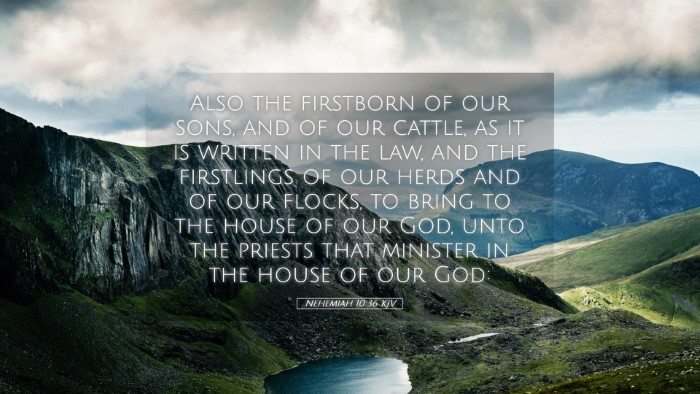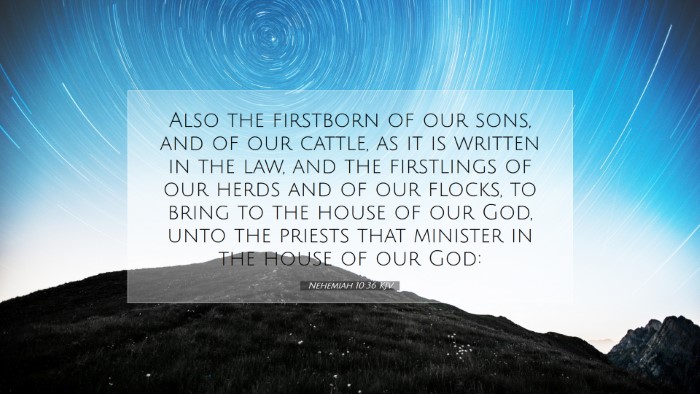Commentary on Nehemiah 10:36
Verse Text: "Also the firstborn of our sons and of our cattle, as it is written in the law, and the firstlings of our herds and of our flocks, to bring to the house of our God, to the priests that minister in the house of our God."
Introduction
The verse under consideration is part of a covenant made by the people of Israel upon their return to Jerusalem and their efforts to restore the city and the temple after the Babylonian exile. Nehemiah 10:36 addresses the responsibility regarding the dedication of firstborns, as prescribed in the Mosaic Law. This commentary seeks to unpack its theological implications and practical applications.
Theological Significance
1. The Principle of Dedication: At the core of this verse is the recognition of God's sovereignty, expressed through the act of dedicating the firstborn sons and the firstlings of their livestock to God. This act is not only obedience to the Law but a profound acknowledgment of God’s ultimate authority over life and sustenance.
2. Continuity of Worship: The reference to the law signifies the continuity of Israel's worship practices. The people of Nehemiah's time were committed to reinstating the ancient traditions and ensuring that the worship of Yahweh was carried out in accordance with the Scriptures. This commitment to the Law reflects a desire for restoration not just of the physical structures but of spiritual integrity.
Insights from Commentaries
Matthew Henry: Matthew Henry emphasizes the importance of the acknowledgment of God’s blessings in the act of dedicating the firstborn. He notes how this presents an important spiritual reality: "When we dedicate to God, we own His right to what we possess." Expanding this, he highlights the idea that dedicating the firstlings serves both as a remembrance of God's provision and as an expression of gratitude and faith.
Albert Barnes: Albert Barnes focuses on the operational aspect of this dedication. He points out that the Law specifically commanded the dedication of the firstborn in Exodus 13:2 and Numbers 18:15-17, underlining its importance in the religious life of Israel. He comments on the practical implications of this: "This was to remind the people that they were to give the best to God, to symbolize their commitment and the principle that all they had ultimately belonged to Him." Barnes also highlights the role of the priests, noting their central place in mediating worship between God and the people, which further elucidates the community’s reliance on priestly intercession.
Adam Clarke: Adam Clarke provides a detailed exposition on the Hebrew terms used in the verse, illustrating that the firstlings are not merely firstborn animals but also carry the weight of holiness and sacrificial intent. He states, "The offerings of the firstborn were holy, set apart for the Lord’s service." Clarke expands on the implications of this practice within the context of the New Covenant, suggesting that the spiritual principle persists through dedication in the life of believers today, as they offer their “first fruits” - their best efforts and lives in service to God.
Historical Context
The historical backdrop of this verse situates it during a period of renewal and covenant reaffirmation. The Israelites, having returned from exile, face the challenge of rebuilding not only their homes but also their community identity rooted in worship. This dedication practice serves as a restoration of the collective memory of God’s faithfulness and the importance of communal worship.
The Restoration Project
Nehemiah’s leadership was pivotal in this effort; through the physical act of rebuilding the wall and the spiritual act of recommitting to covenant practices, the people understood that their identity as a holy nation depended upon their relationship with God. The moment captured in Nehemiah 10:36 is a powerful reminder of this truth.
Practical Application
The implications of Nehemiah 10:36 remain vital for contemporary believers and leaders:
- Understanding Ownership: Just as the Israelites were reminded that their firstborn belonged to God, believers today must recognize the stewardship calling placed upon them. All we possess - time, talents, and treasures - should be seen as God’s gifts, to be used for His glory.
- Prioritizing Worship: This verse calls congregations to prioritize worship in their lives, both individually and communally. Vehicles of worship, like prayer and the preaching of the Word, should take precedence, as they reflect dedication to God.
- Teaching the Next Generation: The process of dedicating firstborns serves as a model for God-centered parenting, where parents teach their children about the holiness of God, their responsibilities, and the importance of offering their lives to Christ.
- Living a Life of Service: Believers ought to consider how they can serve God and others effectively, dedicating their gifts, be they leadership, teaching, or serving, wholly to the Lord.
Conclusion
Nehemiah 10:36 serves as a powerful reminder of the call to dedicate our lives and possessions to God. As we reflect on this commitment, we are challenged to live in a manner that honors God, acknowledging His lordship over every aspect of our lives, echoing the sentiments of the ancient Israelites as they reaffirmed their covenant with God. The insights from the historic commentaries provide an enriched understanding, urging modern readers to maintain a heart of devotion amidst the complexities of modern worship and service.


